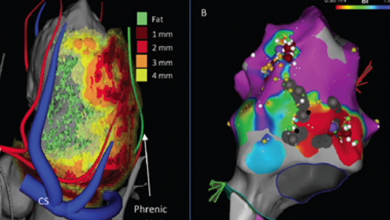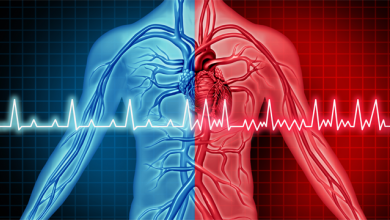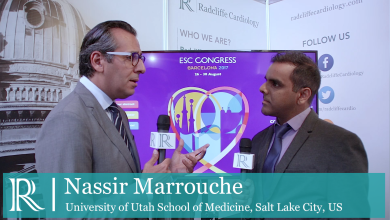Search results
Author(s):
Roland R Tilz
,
Charlotte Eitel
,
Evgeny Lyan
,
et al
Added:
3 years ago
Ventricular tachycardia (VT) is associated with increased mortality in patients with a history of MI. ICD implantation is currently the standard of care for the prevention of sudden cardiac death, and contributes to a reduction of total mortality.1 Despite effective treatment of ventricular arrhythmias with the use of anti-tachycardia pacing (ATP) or shocks, ICDs do not prevent VT. Furthermore,…
View more
Author(s):
Adam J Graham
,
Richard Schilling
Added:
2 years ago
Author(s):
Chen Wei
,
Pierre Qian
,
Usha B Tedrow
,
et al
Added:
3 years ago
Ventricular tachycardia (VT) is a life-threatening sequela found in patients with cardiomyopathy. ICDs can terminate ventricular arrhythmias, but recurrent device shocks lead to reduced quality of life and are associated with higher mortality.1–5 Radiofrequency catheter ablation has emerged as an effective treatment for VT refractory to anti-arrhythmic therapy and has also been shown to reduce…
View more
Author(s):
Charlotte Brouwer
,
Mark G Hazekamp
,
Katja Zeppenfeld
Added:
3 years ago
The reported incidence of congenital heart disease (CHD) depends on the number of trivial lesions included, such as atrial and ventricular septal defects (ASDs and VSDs). Moderate-to-severe CHD numbers remain stable with 6 per 1,000 live births.1 Survival into adulthood has improved dramatically over the last 25 years and has been driven mainly by a decreased mortality in moderate and severe…
View more
Author(s):
Jackson J Liang
,
Pasquale Santangeli
,
David J Callans
Added:
3 years ago
Ventricular tachycardia (VT) is a significant cause of morbidity and mortality in patients with structural heart disease (SHD). While implantable cardioverter-defibrillators (ICDs) have been shown to be effective in preventing sudden death due to ventricular arrhythmias, they are not able to prevent recurrent VT episodes. Antiarrhythmic drugs (AADs) have some demonstrated efficacy in preventing…
View more
Author(s):
Daniele Muser
,
Simon A Castro
,
Jackson J Liang
,
et al
Added:
3 years ago
The role of catheter ablation (CA) in the management of ventricular tachycardia (VT) is becoming increasingly relevant, having repeatedly shown its superiority to medical therapy in reducing the arrhythmic burden, thus improving prognosis and quality of life in patients with structural heart disease presenting with VT.1–4 In such patients, recurrent VT and heart failure (HF) status are connected…
View more
Author(s):
Venkatesh Ravi
,
Jeffrey Winterfield
,
Jackson J Liang
,
et al
Added:
1 year ago
Author(s):
Roland R Tilz
,
Charlotte Eitel
,
Evgeny Lyan
,
et al
Added:
3 years ago
In the article by Tilz et al. entitled “Preventive Ventricular Tachycardia Ablation in Patients With Ischaemic Cardiomyopathy: Meta-analysis of Randomised Trials” (Arrhythmia & Electrophysiology Review 2019;8(3):173–9. https://doi.org/10.15420/aer.2019.31.3), the following correction should be made:
The authors acknowledge that Prof Tilz and Dr Eitel contributed equally as first authors to this…
View more
Author(s):
Nassir F Marrouche
,
Afzal Sohaib
Added:
6 years ago
Afzal Sohaib discusses with Nassir Marrouche from University of Utah School of Medicine, Salt Lake City, US onCatheter Ablation Versus Standard Conventional Treatment in Patients with Left Ventricular Dysfunction and Atrial Fibrillation (CASTLE-AF).
Filmed by Radcliffe Cardiology on-site at ESC 2017.
View more
Author(s):
Eun-Jeong Kim
,
Giovanni Davogustto
,
William G Stevenson
,
et al
Added:
3 years ago
Myocardial scars from infarction or replacement fibrosis in non-ischaemic cardiomyopathies are the common substrate for sustained monomorphic ventricular tachycardia (VT).1,2 In selected patients at high risk of ventricular arrhythmias, placement of an implantable cardioverter-defibrillator (ICD) is effective for prevention of sudden cardiac death.2 Although ICDs are effective in terminating VT…
View more















 « First
« First